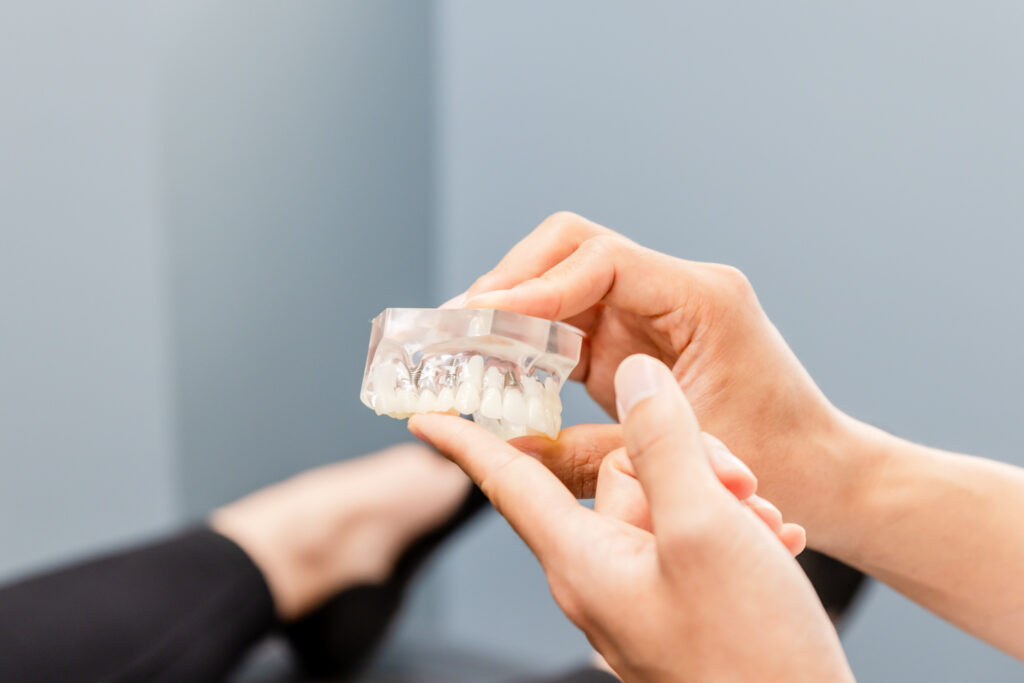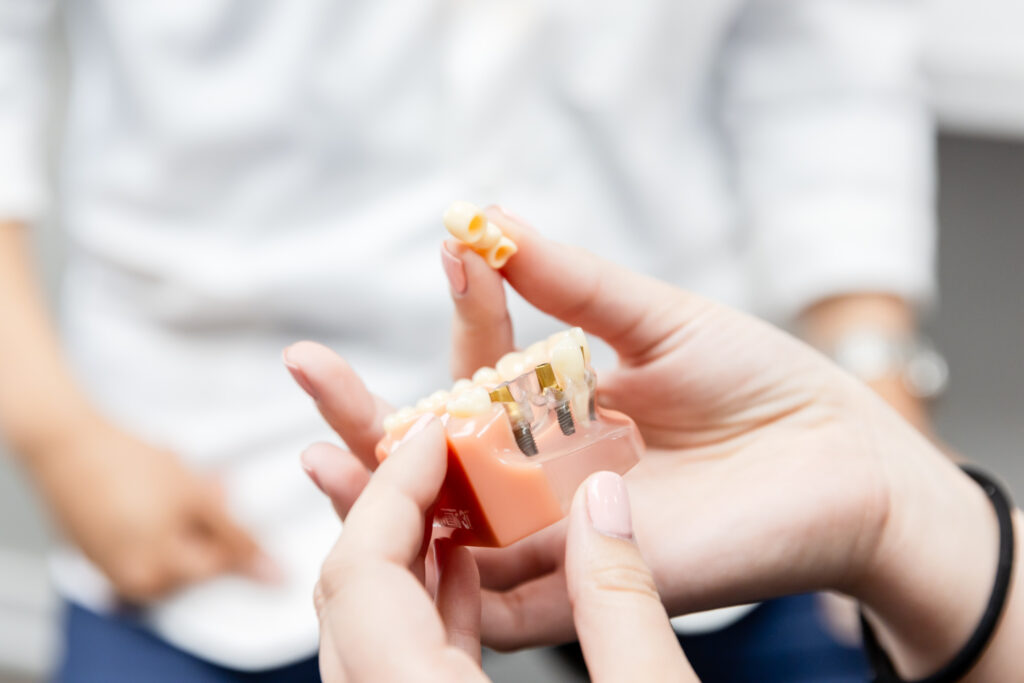The journey to a restored smile begins with a consultation between you and our Gainesville dentist. A consultation offers the opportunity to ask questions and develop a plan that addresses your specific tooth restoration needs using dental implants in Gainesville. During this appointment, we’ll take x-rays and impressions to begin mapping out your treatment plan. We’ll also check to see if there are any procedures that need to take place before we can place your implants.
Dental Implants in Gainesville, VA
Restore the Form & Function of Your Smile With Dental Implants
Missing teeth can make it challenging to chew food properly, affect speech clarity, and leave you feeling self-conscious about the gaps in your smile.
Dental implants are considered the gold standard in the realm of missing teeth replacement. They offer a natural-looking solution that not only preserves the jawbone but also promotes healthy bone growth, maintains the stability and function of your teeth, and provides improved function and security.
With our dental implants in Gainesville, you can expect to have a comfortable and natural-feeling replacement for your missing teeth that enhances your overall appearance and well-being.
Components of Dental Implants
Our implants mimic the natural bone structure of the tooth.
Fixture
A titanium screw is inserted into the jaw bone to become a stable foundation for a crown by integrating with the surrounding bone structure.
Abutment
A custom-made connector that serves to connect the implant fixture with the future crown.
Implant Crown
A custom-made tooth that is fixed on the abutment and implant, blending in with the remaining teeth in color, shape, and size.
Bridge
An implant-supported bridge is composed of 2 single-unit dental implants, spaced apart to restore 3 or more teeth to blend into your smile.
How Dental Implants Work
Dental implants are designed to replicate the function of a natural tooth root, providing a stable foundation for a replacement tooth. The process begins with the careful positioning of an implant fixture, a post-like structure, within the jawbone. This fixture is strategically placed to allow for optimal integration with the surrounding bone. Over a period of typically 3 to 4 months, following tooth extraction and any necessary bone grafting, the implant undergoes a process called osseointegration. The jawbone fuses with the implant during this time, creating a strong and durable bond. This not only ensures the stability of the implant but also stimulates the jawbone, much like a natural tooth root, helping to maintain its strength and preventing deterioration.

The Implant Process
If your dentist clears you for implants, other oral health concerns must be addressed first. Problems like gum disease, poor bone density, untreated injuries, or severely decayed teeth are all treatable, and this step must be taken to ensure you’re in the best condition prior to getting your implant. This may include:
- Gum Disease Treatment: If you have active gum disease, it must be treated and resolved. This can involve deep cleaning procedures like scaling and root planing to remove plaque and tartar, and possibly medication or surgery in more severe cases.
- Bone Density Assessment: Adequate bone density is crucial for implant support. If bone density is insufficient, procedures like bone grafting may be necessary to provide a solid foundation for the implant.
- Addressing Untreated Oral Injuries: Any existing oral injuries, such as jawbone fractures or damaged teeth, need to be fully treated and healed. This ensures a stable and healthy environment for the implant.
- Decayed Teeth Treatment: Severely decayed teeth might need treatment or extraction. This step is vital to prevent the spread of decay or infection to the implant site.
- Overall Health Evaluation: General health conditions, such as diabetes or osteoporosis, that might affect bone healing and regeneration need to be managed effectively.
- Lifestyle Adjustments: Patients may be advised to quit smoking or make other lifestyle changes, as smoking can hinder the healing process and decrease the success rate of implants.
- Custom Treatment Planning: Your dentist might also create a tailored treatment plan, which could include specific medications, dietary adjustments, or special oral hygiene practices to prepare the mouth for the implant procedure.
It begins with a surgical procedure where your dentist in Gainesville makes a precise incision in the gum to access the jawbone. Then, using specialized tools, a hole is carefully drilled into the bone where the dental implant, a titanium post, will be placed. The area is then closed with stitches, and a period of healing is allowed for the implant to integrate with the bone – a process known as osseointegration.
Dental implants often require several stages, which may involve short periods where the patient is without a tooth. However, depending on the situation, there are options available to avoid being without a tooth during the implant process such as temporary crowns.
After having enough time to integrate with the supporting bone structure, the implant post should be stable enough to place an abutment. An abutment acts as the connecting piece between the implant post and dental crown, connecting the entire appliance together.
Based on your treatment plan, a customized crown is built to match your color, size, and shape preference. Once the crown is cemented or screwed into place, you will enjoy a strong, healthy, and appealing smile for a lifetime.
What to Expect
To ensure that the full process runs smoothly, a patient must follow a certain protocol on their journey to receive dental implants.
The procedure typically involves 5 to 7 visits, which include fixture placement, healing checks, and scans to ensure a successful final restoration.
After the implant has fully healed, it is uncovered, and a digital scan is taken to create a custom-made abutment and crown at a lab. This abutment and crown will function as a permanent tooth, providing optimal function and aesthetics.

Why Get Dental Implants in Gainesville?
Dental implants offer numerous advantages over other restorative options.
Natural Appearance
Dental implants not only look aesthetically pleasing, but they also function exceptionally well, especially in situations where the tooth structure that would normally support a crown is inadequate or absent.
Long Lasting
Dental implants are renowned for their longevity and can last for an extended period, potentially even permanently. In situations where the dental implant crown requires replacement, the dental post remains intact, providing a solid foundation for a new crown.
The Closest Thing to Real Teeth
Dental implants are considered the gold standard in tooth replacement, as they restore natural function and aesthetics to your smile. They feel and look like your natural teeth!
Frequently Asked Questions
Dental implants are synthetically developed tooth structures that are capable of replacing missing teeth to benefit appearance, function, and health. Rather than just sitting on the gum tissue like many restorative devices, dental implants connect with the jawbone and derive support and stability from your own connective tissue. This makes them more appealing as they last longer, feel more natural, and closely match the capabilities of a natural tooth.
The most significant amount of time in the dental implant process is attributed to the bone healing cycle and the integration of the implant, which usually takes around 3-4 months to complete.
Absolutely! Implants can be utilized to anchor and stabilize dentures, providing an excellent option for those who wear removable appliances. Your dentist will use 4 to 6 implants to secure a full arch of teeth in place, giving you a much more stable and comfortable restoration.
To determine the suitability for dental implants, an initial assessment of your jaw bone is necessary, which is typically performed using a 3D cone beam scan. The amount of bone available, as well as your oral and gum health, will be taken into consideration to determine the feasibility of the implant procedure. Here are some key considerations we factor in when assessing whether implants are right for you:
- Oral Health: Healthy gums and sufficient bone density are crucial for supporting implants. If you have conditions like gum disease or bone loss, they need to be addressed first.
- General Health: Good general health is important. Chronic conditions like diabetes or heart disease don’t automatically disqualify you, but they need to be well-managed. Smoking can also impact the healing process and implant success.
- Oral Hygiene Habits: Commitment to good oral hygiene is vital. Regular brushing, flossing, and dental check-ups are necessary to maintain the health of the implant.
- Age: Adults of any age can be candidates. However, implants are typically not recommended for children or adolescents whose jawbones haven’t fully developed.
- Lifestyle Factors: Habits like smoking or heavy drinking can negatively affect the success of implants.
- Allergies or Sensitivities: If you have any known allergies to metals or specific materials used in implants, this should be discussed with your Gainesvill dentist.
The cost of a full implant procedure varies based on a multitude of different factors; this may include the type of implant chosen, the number of teeth missing, or your need for preliminary treatment. While it’s not possible for us to provide a true estimate of the expense due to these factors, you may be able to receive more information upon attending a consultation with our dentists.
Yes, dental implants are considered safe and are one of the most successful and well-established procedures in dentistry. However, as with any medical procedure, there are risks and considerations to be aware of:
- High Success Rate: Dental implants have a high success rate, often cited around 95-98%. Success depends on the quality and quantity of the bone, and your overall health and oral hygiene.
- Biocompatibility: Implants are typically made from titanium, a material known for its strength and biocompatibility, meaning it’s generally well accepted by the body and has a low risk of rejection.
- Infection Risk: As with any surgical procedure, there is a risk of infection. However, this risk can be minimized with proper surgical technique and post-operative care.
- Damage to Surrounding Structures: There is a small risk of damage to surrounding teeth, blood vessels, or nerves during the implant procedure. An experienced dental surgeon like ours will use imaging technology to minimize this risk.
- Osseointegration Risk: In rare cases, the implant may not properly integrate with the jawbone, which can lead to implant failure. Factors like smoking, poor bone quality, and certain medical conditions can increase this risk.
- Long-Term Safety: Long-term, implants can help prevent bone loss in the jaw, maintain alignment of surrounding teeth, and provide stable support for artificial teeth, contributing to overall oral health.
Yes! Our senior patients benefit a great deal from the health and aesthetic benefits dental implants can bring. In fact, there is no upper age limit for getting dental implants. They can be an excellent option for older adults for several reasons:
- Age is Not a Major Factor: Dental implant success is more related to overall health and the condition of the jawbone than to age. Many seniors successfully receive implants.
- Bone Loss Prevention: Implants can help prevent bone loss in the jaw, a common issue in older adults, especially those who have lost teeth.
- Improved Quality of Life: Implants can improve the ability to eat and speak comfortably, enhancing overall quality of life. They also eliminate the inconveniences often associated with traditional dentures.
- Durability and Stability: Implants are stable and can last for many years, often a lifetime, making them a good long-term solution for seniors.

The Finest Dental Implants in Gainesville
The GoSmiles team is here to keep your family smiling.








